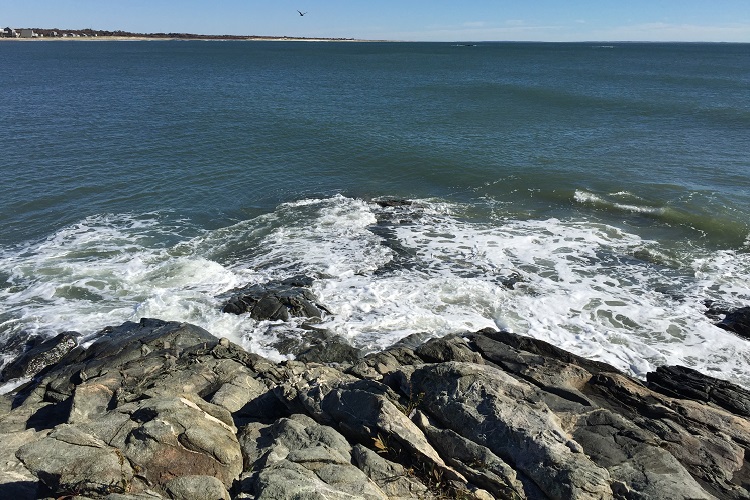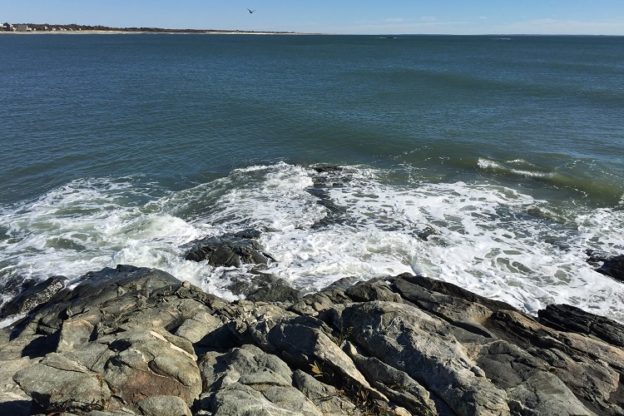Nothing says Massachusetts like the ocean. Beautiful coastlines, sparkling beaches, and local seafood are part of what makes our commonwealth special. The ocean provides humans and wildlife with so much that allows us to thrive.
Now, the ocean needs our help.

A giant, blue sponge
The ocean is one of the world’s largest, natural carbon and heat sponges. It soaks up rampant carbon dioxide and a majority of the heat within the atmosphere created by our excess greenhouse gas emissions. Natural carbon sponges are normally excellent allies in our collective climate fight – however, we’ve exceeded our ocean’s capacity.
Two sides to the blue coin: warmer and more acidic waters
The more heat our ocean sucks up, the warmer its waters become. Globally, the ocean’s surface has warmed about 1.5°F since the beginning of the 20th century. This means that while the world’s temperatures slowly warm, so do our ocean’s waters. At the same time, the more carbon dioxide the ocean soaks up, the more acidic its waters become. All that excess carbon dioxide interacts with seawater’s pH, which increases ocean acidity.
We’re seeing the impacts of warmer and more acidic waters both on people and wildlife alike right now. Here’s how:
Sea level rise
Increasing ocean and air temperatures melt glaciers and land ice, adding more water to the ocean. Additionally, warmer temperatures cause water to expand, and push our tides farther up along our shores. Sea level rise also puts coastal communities at elevated risk for severe flooding and intense storm events.
A suffocating ocean
Increased temperatures decrease the amount of oxygen our ocean can hold. Warmer waters generally contain less oxygen, amplify how much oxygen marine organisms need, and promote harmful algal blooms that further worsen oxygen loss. Ocean oxygen loss, otherwise known as hypoxia, therefore creates uninhabitable zones for marine wildlife.
Marine organisms
We can also see climate change’s impacts on our marine organisms, who have been scrambling to new habitats with suitable water temperatures to survive and find food. The marine organisms we depend on for our local economies and love to see recreationally are either moving deeper into the ocean or moving northward.
Ocean acidification further impacts marine organisms by degrading the shells and exoskeletons that protect them. Important shellfish to Massachusetts’ local seafood economy and marine ecosystems, like mussels, are weakening because of ocean acidification’s impact.
How we can help
Our ocean deserves our love and support. We must come together and take an oath to our ocean to fight climate change by reducing our greenhouse gas emissions – protecting the people and wildlife that depend on our big, blue world.
Our newsletter, Climate Connection, keeps you up to date on climate news, Mass Audubon’s climate action initiatives, and ways that we can tackle our collective climate fight.
Take Mass Audubon’s Climate Pledge
You can pledge to reduce your greenhouse gas emissions both individually and as a community.
Purchase and eat local, sustainable seafood
Purchasing locally caught and sustainable seafood can help fight climate change by reducing the amount of greenhouse gas emissions needed to get your food to your plate – all while combating other threats amplified by climate change, like overfishing. Take some time to learn more about where your seafood comes from, how it was caught, and whether it’s in season.
Shipping demands for non-local seafood, certain types of fish farming, and even the way your seafood was caught all affect how big its carbon footprint is. Buying locally and sustainably, helps reduce that carbon footprint.





